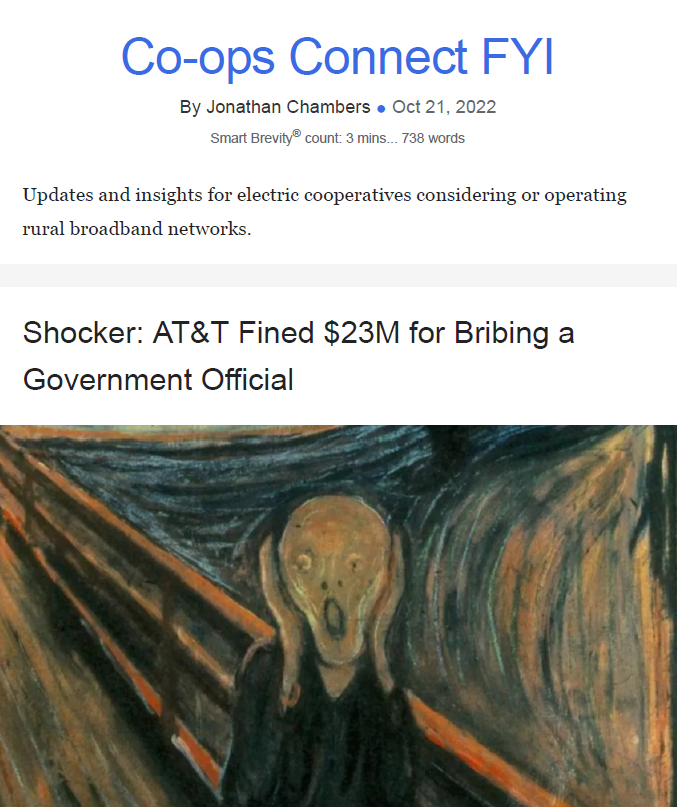Shocker: AT&T Fined $23M for Bribing a Government Official
October 21, 2022
I was shocked to read the news this week: AT&T had bribed a senior state legislator for his support of legislation AT&T favored.
Wait, what?
- This wasn’t some rogue lobbyist behavior.
- It was the conduct of the President of AT&T Illinois and other AT&T employees.
- The fall-out: AT&T has agreed to pay a fine of $23 million for its actions and to cooperate further with the Justice Department investigation.
But why? What specifically was AT&T seeking for its bribe?
- To be relieved of Carrier of Last Resort (COLR) obligations.
- Those are the universal service requirements AT&T and nearly every telephone company agreed to in exchange for government protection and billions in public funding.
Why it matters:
Though AT&T was glad to take tens of billions of dollars in public funding, spectrum licenses, and government protection over many decades, it wanted to end its legal obligation to provide rural service when it decided such service was no longer in its business interest.
During the period of the investigation, AT&T was given over $3 billion by the FCC for doing the thing (i.e., providing rural service) for which it was seeking relief in the legislation (i.e., not providing rural service).
Bottom line: The corruption of a single legislator is less significant than the long-term corruption of public policy.
The Backstory: to Rural Service
A decade ago, AT&T was going through some sort of a mid-life crisis.
- The company had relied for decades on government protection of its monopoly, going back to the Kingsbury Commitment of 1913.
- But the boring dumb pipe telephone business wasn’t very sexy, especially not rural service.
- AT&T sought to enter the television and movie business. It acquired DirecTV and Time Warner.
- The rural business was a drag. So, AT&T decided to jettison rural service, even as it was still hoovering in government subsidies.
I was at the FCC in 2012, when AT&T senior management visited us to explain its long-range network plan to:
1. Invest heavily in fiber in urban areas and dense suburban areas.
2. Upgrade its DSL networks in less dense suburban areas.
3. Serve rural areas with fixed wireless using its 4G LTE networks.
Yes, but:
- AT&T needed permission from the government to abandon its rural service or even change the nature of the rural service.
- In fact, it needed approval from both federal and state regulators or a change in federal and state laws.
The Drag of Vestigial Regulation
At the federal level, Section 214 of the Communications Act requires approval from the FCC when a telecommunications carrier wants to retire copper plant.
- When I was at the FCC, the Commission finally ended that requirement for retiring telegraph lines.
- I was sympathetic to AT&T’s plight. They wanted to abandon rural service, and that was a slow regulatory process.
At the state level, Carrier of Last Resort obligations ensure everyone has access to service.
- Most state public service commissions are reluctant to leave their citizens unserved.
- AT&T focused its efforts on state legislatures to remove the authority from state commissions.
Why it matters:
AT&T had to work both Washington and state capitals in seeking relief from federal Sec. 214 and state COLR obligations.
Is it culture or a one-off? Surely the Illinois bribery is an isolated case.
- While I was at the FCC, AT&T threatened me, attacked me, and tried to get me fired, but they never tried to bribe me.
- It is true the head of AT&T’s Washington office was fired for paying Michael Cohen $600,000 during the Trump Administration transition.
- But I’m sure that, too, was an isolated case.
Meanwhile, Back in Rural America
The Justice Department has mandated that AT&T implement an ethics program in addition to the fine.
Yes, but that ethics program is:
- Only in Illinois.
- Only for two years.
- Bottom line: That ought to take care of it.
The big picture:
I, for one, am glad for rural America to see the back of AT&T.
- Electric co-ops are the right institutions to serve rural America with broadband.
- Public funding is put to better use when the funding is competitive and when electric co-ops get involved, as I discussed last week.

